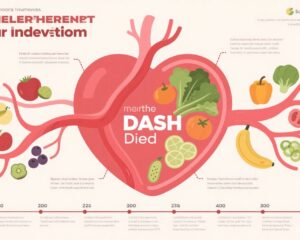Highlight
– Two distinct 4-week dietary interventions (low FODMAP plus traditional advice and low-carbohydrate diet) significantly reduced IBS symptom severity more than optimized pharmacological treatment.
– Large randomized controlled trial (n=294) with blinded dietary arms and symptom-based medical treatment.
– High completion rates and low adverse event-related discontinuations across all groups support tolerability.
– The study supports dietary interventions as viable first-line treatment options for moderate-to-severe IBS.
Study Background and Disease Burden
Irritable bowel syndrome (IBS) is a prevalent functional gastrointestinal disorder characterized by abdominal pain, altered bowel habits, and bloating. It affects up to 10-15% of the population worldwide, substantially impairing quality of life and generating high healthcare costs. Dietary modification is a cornerstone of IBS management, with the low-FODMAP diet gaining prominence for reducing fermentable carbohydrate intake that can provoke symptoms. Meanwhile, low-carbohydrate diets have also been advocated based on their effects on gut microbiota and symptom modulation. Pharmacological treatments remain pivotal, especially when symptom severity is high, but evidence directly comparing dietary interventions with symptom-targeted pharmacotherapy has been limited. The CARIBS trial aimed to fill this critical gap by evaluating the efficacy of these approaches head-to-head in adults with moderate-to-severe IBS.
Study Design
The CARIBS trial was a single-center, single-blind, randomized controlled study conducted at the Sahlgrenska University Hospital outpatient clinic in Gothenburg, Sweden. Eligible participants were adults aged 18 or older with moderate-to-severe IBS defined by Rome IV criteria and an IBS Severity Scoring System (IBS-SSS) score of 175 or higher. Exclusion criteria included serious comorbidities and food allergies.
Participants (n=294) were randomized equally into three arms: (1) a diet low in fermentable oligosaccharides, disaccharides, monosaccharides, and polyols (FODMAPs) combined with traditional IBS dietary advice based on UK NICE guidelines (LFTD diet), (2) a fibre-optimized low-carbohydrate, high-protein, and high-fat diet (low-carbohydrate diet), and (3) optimized pharmacological treatment tailored to the predominant IBS symptom. Diet group participants were blinded to the specific diet label, whereas pharmacological treatment was openly administered.
The intervention duration was 4 weeks. Dietary groups were later unmasked and instructed on long-term management and FODMAP reintroduction (LFTD group) and encouraged to continue. Participants on medical treatment were offered dietary counselling post-intervention. The primary endpoint was a clinical response defined as a reduction of 50 points or more in IBS-SSS relative to baseline, analyzed in a modified intention-to-treat population comprising all who initiated treatment.
Key Findings
Of the 294 participants included, 241 (82%) were female, the mean age was 38 years (SD 13), and the distribution across groups was balanced. After 4 weeks:
- 76% (73/96) of the LFTD diet group achieved the primary endpoint.
- 71% (69/97) of those in the low-carbohydrate diet group responded.
- 58% (59/101) receiving optimized medical treatment responded.
The between-group difference was statistically significant (p=0.023), favoring dietary interventions. Completion rates were high (90–95%), with low dropout due to adverse events: two per dietary group and five (5%) in the medication group, with no serious adverse events or treatment-related deaths reported.
These results demonstrate a clinically meaningful benefit of dietary modifications over pharmacological therapy alone in this population during a short-term intervention. Both diets achieved larger effect sizes in reducing IBS symptom severity, suggesting that restrictive dietary approaches can be effective first-line options.
Expert Commentary
This study addresses a significant unmet need in IBS management by directly comparing leading dietary therapies against symptom-targeted medications, using rigorous methodological design and validated endpoints. The single-blind design with masked dietary arms strengthens internal validity, while the broad inclusion criteria enhance generalizability to typical moderate-to-severe IBS patients.
Despite these strengths, limitations include the short intervention period and open-label pharmacological treatment, which could introduce bias. Long-term adherence and effects beyond 4 weeks—though partially captured by follow-up instructions—require further investigation. Additionally, outcomes beyond symptom severity, such as quality of life or microbiome changes, would enrich understanding. Future research should explore personalized treatment algorithms combining diet and pharmacotherapy tailored to patient symptoms and preferences.
Conclusion
The CARIBS trial provides compelling evidence that dietary treatment with either a low FODMAP plus traditional dietary advice or a low-carbohydrate diet offers superior symptom relief compared to optimized pharmacological treatment in adults with moderate-to-severe IBS over 4 weeks. These findings support considering dietary interventions as first-line therapy and highlight the need for further research into personalized and sustainable approaches integrating diet and medication in IBS care.
References
Nybacka S, Törnblom H, Josefsson A, Hreinsson JP, Böhn L, Frändemark Å, Weznaver C, Störsrud S, Simrén M. A low FODMAP diet plus traditional dietary advice versus a low-carbohydrate diet versus pharmacological treatment in irritable bowel syndrome (CARIBS): a single-centre, single-blind, randomised controlled trial. Lancet Gastroenterol Hepatol. 2024 Jun;9(6):507-520. doi: 10.1016/S2468-1253(24)00045-1. Epub 2024 Apr 18.
Mearin F, Lacy BE, Chang L, et al. Bowel Disorders. Gastroenterology. 2016;150(6):1393-1407.e5. doi:10.1053/j.gastro.2016.02.031.
Staudacher HM, Whelan K. The low FODMAP diet: recent advances in understanding its mechanisms and efficacy in IBS. Gut. 2017;66(8):1517-1527. doi:10.1136/gutjnl-2017-314179.
Ford AC, Moayyedi P, Lacy BE, et al. American College of Gastroenterology Monograph on the Management of Irritable Bowel Syndrome and Chronic Idiopathic Constipation. Am J Gastroenterol. 2018;113(Suppl 2):1-18. doi:10.1038/s41395-018-0246-9.



